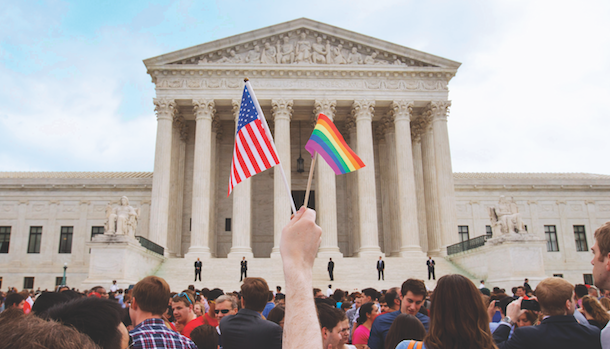Manning’s Status as Gay Soldier Key to Defense
By DAVID DISHNEAU and PAULINE JELINEK
FORT MEADE, Md. – Lawyers representing the young Army intelligence specialist accused of leaking U.S. military and diplomatic secrets are arguing his personal struggles with being a gay soldier influenced his actions as a military hearing that could lead to his court martial enters its third day.
Pfc. Bradley Manning is accused of leaking hundreds of thousands of sensitive items to the anti-secrecy online group WikiLeaks, including Iraq and Afghanistan war logs, State Department cables and a military video of a 2007 American helicopter attack in Iraq that killed 11 men.
Prosecutors at the pretrial hearing are expected to call more witnesses Sunday as they build their case to connect Manning to the publication of the material by WikiLeaks. The hearing is being held at a post outside Washington to determine whether Manning will be court-martialed on 22 counts, including aiding the enemy. Manning, who turned 24 on Saturday, could face a term of life in prison as a traitor.
The Obama administration says the released information has threatened valuable military and diplomatic sources and strained America’s relations with other governments. Manning’s lawyers counter that much of the information that was classified by the Pentagon posed no risk.
But among the first issues to arise on Saturday was whether Manning’s sexual orientation is relevant to the case against him. His attorneys maintained that his status as a homosexual in the military before the repeal of “don’t ask, don’t tell” contributed to mental and emotional problems that should have barred him from having access to sensitive material.
The defense revealed that Manning had written to one of his supervisors in Baghdad before his arrest, saying he was suffering from gender-identity disorder. He included a picture of himself dressed as a woman and talked about how it was affecting his ability to do his job and even think clearly.
Maj. Matthew Kemkes, one of Manning’s lawyers, asked Special Agent Toni Graham, an Army criminal investigator, whether she had talked to people who believed Manning was gay or found evidence among his belongings relating to gender-identity disorder. The condition often is described as a mental diagnosis in which people believe they were born the wrong sex.
Graham said such questions were irrelevant to the investigation.
“We already knew before we arrived that Pfc. Manning was a homosexual,” Graham said.
Prosecutors objected several times to the questions. Kemkes responded that if the government can argue that Manning intended to leak secrets, “what is going on in my client’s mind is very important.”
During cross-examination of Treasury Department Special Agent Troy Bettencourt, who investigated the case, defense attorney Capt. Paul Bouchard asked if he believed Manning’s military leaders failed him, given his behavior such as overturning a table and throwing a chair in episodes of rage.
Bettencourt said that in hindsight, “I would like to think that had I been in the chain of command, I would have maybe done things differently. I would have been aware of everything we now know to prevent him from deploying- but that is with the benefit of hindsight.”
Prosecutor Capt. Joe Morrow quickly asked Bettencourt if he believes people who have signed nondisclosure agreements, like Manning, “have an individual responsibility to safeguard classified information.” Bettencourt replied, “Yes.”
One of Manning’s commanders in Baghdad, Capt. Steven Lim, said Manning should have had his security clearance suspended because of his problems. Lim said the outbursts occurred before he arrived, and that when he learned of them after Manning’s arrest, he was shocked. Lim said he was also unaware that Manning believed he was suffering from gender-identity disorder.
Manning’s appearances over the last two days in the Fort Meade courtroom marked the first time he has been seen in public after 19 months in detention. The Oklahoma native comes to court in Army camouflage fatigues and wearing dark-rimmed glasses. Manning sat calmly in the courtroom Saturday without appearing to react to the testimony, even when centered on his troubled mental state and homosexuality. Manning listened intently and regularly took notes.
The case has spawned an international support network of people who believe the U.S. government has gone too far in seeking to punish Manning.










